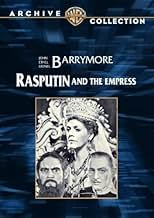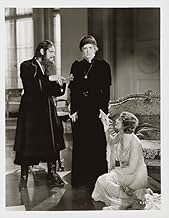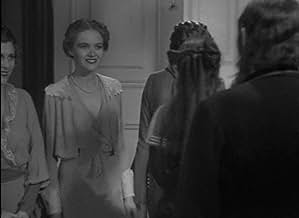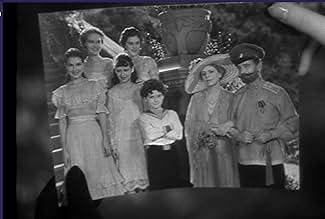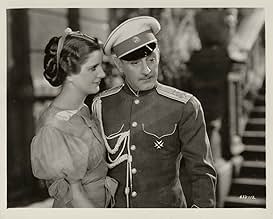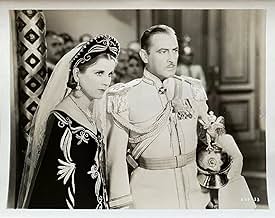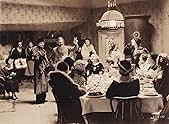IMDb-BEWERTUNG
6,5/10
1291
IHRE BEWERTUNG
Füge eine Handlung in deiner Sprache hinzuA prince plots to kill the mad monk Rasputin for the good of the czar, the czarina and Russia.A prince plots to kill the mad monk Rasputin for the good of the czar, the czarina and Russia.A prince plots to kill the mad monk Rasputin for the good of the czar, the czarina and Russia.
- Für 1 Oscar nominiert
- 4 Gewinne & 1 Nominierung insgesamt
Luis Alberni
- Photographer's Assistant
- (Nicht genannt)
Mary Alden
- Natasha's Lady in Waiting
- (Nicht genannt)
Robert Anderson
- Undetermined Secondary Role
- (Nicht genannt)
Oscar Apfel
- Undetermined Secondary Role
- (Nicht genannt)
Henry Armetta
- Photographer
- (Nicht genannt)
Hooper Atchley
- Rasputin's Henchman
- (Nicht genannt)
Mischa Auer
- Butler Pouring Drinks at Party
- (Nicht genannt)
Reginald Barlow
- General Who Underestimated the Japanese
- (Nicht genannt)
Barbara Barondess
- Woman Getting Cigarette
- (Nicht genannt)
Max Barwyn
- Bald Man Trying to See Duna
- (Nicht genannt)
Empfohlene Bewertungen
"Rasputin and the Empress" has the distinction of being the only movie that features siblings John, Ethel and Lionel Barrymore. However, of the three, Lionel is DEFINITELY the star and he's given ample opportunity to act and overact...and it's all very enjoyable to watch. His version of Rasputin certainly is NOT subtle.
Now there is a problem with making a film about Rasputin and that is there is a lot of lore involved. Many of the supposed 'facts' are obvious exaggerations....with the man having weird mystical powers and his death is clearly NOT realistically portrayed in history books. Fortunately, MGM chooses to make Rasputin evil but 100% human and without laser shooting out of his eyes!
The story begins in 1905, which is problematic since the film ends in mid-1918 with the murder of the Czar and his family. I say problematic because the children in the story never age! Additionally, although Rasputin had a personal relationship with the Czar and his family for about a decade, here in the film is looks like only a few months or perhaps a year. The fact is that the story wasn't intended as a history lesson and MGM made a few artistic changes here and there...something which probably made the film more enjoyable for most audience members.
As far as portraying this evil monk goes, Lionel Barrymore imbued him an amazing over-the-top personality and humanized him. Humanized because the tricks he does in the film are simply tricks--such as hypnotism and spying on folks in order to 'magically' know their secrets. It's all very enjoyable to watch and never is dull.
As for John, he has a relatively meaty role but is far, far more subdued. You do see him emote strongly during the murder sequence (one that varies tremendously with most accepted versions)....but otherwise he plays his role very straight.
Ethel, on the other hand, has a rather normal and even somewhat bland role in the movie. Simply put, any decent actress could have done her part.
So is it any good? Exceedingly so, yes. The story is never dull, is very big and exciting. And, even though they use a lot of stock footage, its inclusion isn't at all a detriment to the movie. Well worth seeing and quite enjoyable.
Now there is a problem with making a film about Rasputin and that is there is a lot of lore involved. Many of the supposed 'facts' are obvious exaggerations....with the man having weird mystical powers and his death is clearly NOT realistically portrayed in history books. Fortunately, MGM chooses to make Rasputin evil but 100% human and without laser shooting out of his eyes!
The story begins in 1905, which is problematic since the film ends in mid-1918 with the murder of the Czar and his family. I say problematic because the children in the story never age! Additionally, although Rasputin had a personal relationship with the Czar and his family for about a decade, here in the film is looks like only a few months or perhaps a year. The fact is that the story wasn't intended as a history lesson and MGM made a few artistic changes here and there...something which probably made the film more enjoyable for most audience members.
As far as portraying this evil monk goes, Lionel Barrymore imbued him an amazing over-the-top personality and humanized him. Humanized because the tricks he does in the film are simply tricks--such as hypnotism and spying on folks in order to 'magically' know their secrets. It's all very enjoyable to watch and never is dull.
As for John, he has a relatively meaty role but is far, far more subdued. You do see him emote strongly during the murder sequence (one that varies tremendously with most accepted versions)....but otherwise he plays his role very straight.
Ethel, on the other hand, has a rather normal and even somewhat bland role in the movie. Simply put, any decent actress could have done her part.
So is it any good? Exceedingly so, yes. The story is never dull, is very big and exciting. And, even though they use a lot of stock footage, its inclusion isn't at all a detriment to the movie. Well worth seeing and quite enjoyable.
A true example of the assembly line style film-making of the old studios, where one doubts if the screenwriter ever visit the set, or did the director ever sit at an editing bench. Lionel Barrymore, however is a treat as the grimy, kooky Rasputin. He doesn't go for one-note scary. He's seen as a fun party animal, a believable healer, and the world's worst dinner guest. Other than that, John is wasted as the hero, as is their sister Ethel.
Plot in a Nutshell: Russian Prince Chegodieff (John Barrymore) tries to stop the evil Rasputin (Lionel Barrymore) from exerting his influence over Czarina Alexandra (Ethel Barrymore).
Why I rated it a '7': That's a lot of Barrymore! Admittedly, that fact alone doesn't make it a 7, but seeing the three accomplished siblings together here (for the only time in celluloid history) IS worth a few extra points. This is an interesting tale, showing how an unknown/outsider was able to insert himself into the lives of the Russian royal family and influence them in ways one wouldn't think possible. I will say that the film goes out of its way to denigrate Rasputin. I don't think he needed any help, really, but in addition to his actual crimes, he is shown here to be a war-monger, royal rapist and freedom-hating enemy of the peasants. Lol that's quite a despicable guy! Some reviewers have complained that "Rasputin" is not always true to history (in some ways, it's not), but what this tells me is that Hollywood apparently has been making historically inaccurate films for perhaps longer than anyone thought. If you can forgive it that, it's otherwise pretty entertaining.
Best line: "You know, people with visions like yours, my dear father, are sometimes rather unlucky. There was a general, not long ago, who shot himself in the back. No one could understand quite how he did it!"
Would I watch again (Y/N)?: Yes.
Why I rated it a '7': That's a lot of Barrymore! Admittedly, that fact alone doesn't make it a 7, but seeing the three accomplished siblings together here (for the only time in celluloid history) IS worth a few extra points. This is an interesting tale, showing how an unknown/outsider was able to insert himself into the lives of the Russian royal family and influence them in ways one wouldn't think possible. I will say that the film goes out of its way to denigrate Rasputin. I don't think he needed any help, really, but in addition to his actual crimes, he is shown here to be a war-monger, royal rapist and freedom-hating enemy of the peasants. Lol that's quite a despicable guy! Some reviewers have complained that "Rasputin" is not always true to history (in some ways, it's not), but what this tells me is that Hollywood apparently has been making historically inaccurate films for perhaps longer than anyone thought. If you can forgive it that, it's otherwise pretty entertaining.
Best line: "You know, people with visions like yours, my dear father, are sometimes rather unlucky. There was a general, not long ago, who shot himself in the back. No one could understand quite how he did it!"
Would I watch again (Y/N)?: Yes.
By now, everyone - but everyone - has commented on what bad history this movie is. Fine, I won't argue the point. But, what about it as drama? In my opinion, this is one of the most powerful tales of tragedy of it's time. ( This is particularly noteworthy given MGM's later penchant for frivolousness. ) Part of it has do do with the sincerity and conviction of the story. [ Alhough Charles MacArtur and others are given credit for the screenplay, I believe the original story - I have read a copy of the book - was written by a Russian émigré who fled the revolution. Unfortunately, I am presently unable to locate my copy. ] Nonetheless, this would go a long way towards explaining the movie's passion.
As for the acting; it features an outstanding cast, including the three Barrymores, as well as an assemblage of first rate supporting actors of the time. ( Anyone notice Edwarld Arnold as Dr. Remezov? ) Of course, much of it seems dated by today's standards. ( This was 1932, after all. ) Keep in mind that this is high melodrama. In that context, Lionel Barrymore exudes pure evil as the scheming, mad monk. He also brings out the crudity and vulgarity of the man, which generally jibes with historical accounts. Just try not to dwell on the fake beard.
John is fine and properly earnest as Prince Chegodieff, although his performance does seem a bit old-fashioned next to Lionel's. He really lets it all hang out in the murder scene, however. Ethel seems a trifle stiff, but Ralph Morgan is just right as Nicholas. In fact, sincerity and seriousness of purpose seem to be the hallmarks of the entire ensemble. And through it all, there is this sense of tragic inevitability; of events that, once set in motion, cannot be reversed.
One other thing that warrants a mention is the music. The Russian Orthodox liturgical music used in the celebratory scene near the beginning is moving and powerful. It could well put one in mind of the the wedding scene in Michael Cimino's "The Deer Hunter" ( 1978 ). Later, there is a medley of martial music, accompanied by historical footage, as Russia mobilizes for The Great War. Here we hear "God Save the Tsar", a tune which Mikhail Glinka featured in his opera, "A Life for the Tsar", but which was routinely banned during Soviet performances. All in all, exciting stuff.
This is a movie well worth watching, historical accuracy notwithstanding.
As for the acting; it features an outstanding cast, including the three Barrymores, as well as an assemblage of first rate supporting actors of the time. ( Anyone notice Edwarld Arnold as Dr. Remezov? ) Of course, much of it seems dated by today's standards. ( This was 1932, after all. ) Keep in mind that this is high melodrama. In that context, Lionel Barrymore exudes pure evil as the scheming, mad monk. He also brings out the crudity and vulgarity of the man, which generally jibes with historical accounts. Just try not to dwell on the fake beard.
John is fine and properly earnest as Prince Chegodieff, although his performance does seem a bit old-fashioned next to Lionel's. He really lets it all hang out in the murder scene, however. Ethel seems a trifle stiff, but Ralph Morgan is just right as Nicholas. In fact, sincerity and seriousness of purpose seem to be the hallmarks of the entire ensemble. And through it all, there is this sense of tragic inevitability; of events that, once set in motion, cannot be reversed.
One other thing that warrants a mention is the music. The Russian Orthodox liturgical music used in the celebratory scene near the beginning is moving and powerful. It could well put one in mind of the the wedding scene in Michael Cimino's "The Deer Hunter" ( 1978 ). Later, there is a medley of martial music, accompanied by historical footage, as Russia mobilizes for The Great War. Here we hear "God Save the Tsar", a tune which Mikhail Glinka featured in his opera, "A Life for the Tsar", but which was routinely banned during Soviet performances. All in all, exciting stuff.
This is a movie well worth watching, historical accuracy notwithstanding.
...forget about it. This film is completely inaccurate in its portrayal of actual events in Russian history. As for the nature and character of the historical figures involved, the three Barrymores give good renditions. There is Ethel Barrymore looking every inch the empress and giving a convincing portrayal of a woman concerned for the welfare of her very ill son - and I would expect that. What I didn't expect is how weird it would be to watch a film in which John Barrymore is the shining hero and Lionel Barrymore is a truly diabolical villain, and each are spectacularly convincing in their portrayals. Lionel is really the center of attention here as he plays the evil Rasputin whose ability to sidestep assassination attempts is legendary, and here a few logical explanations are given to some of his alleged abilities. However, none can explain what happened at the end of his life - how he was poisoned, bludgeoned, shot, and finally thrown into an icy river and still managed to cling to life for awhile.
Although Tsar Nicholas is accurately portrayed as a rather weak willed man and the Romanov marriage is also accurately portrayed as one of the few royal arranged marriages that also turned out to be a love match, there is a mischaracterization of the Tsar as being progressive and wanting a Duma only to have Rasputin defeat that plan. In fact, Nicholas was autocratic in his outlook and distrusted any attempt to give the people more say in their government. This sets up one of the great ironic struggles in the film - that of aristocrat Prince Paul Chegodieff (John Barrymore) wanting more for the peasants in the way of both bread and democracy, and that of peasant mystic Rasputin (Lionel Barrymore) saying that it was God's will that the peasants were poor and powerless. Paul wants to save Russia, Rasputin wants to rule it.
Another piece of fiction shown in the movie for dramatic measure are the public proclamations about the illness of Tsaravich Alexai, the heir to the Russian throne. In fact one of the things that turned the Russian people against the royal family - besides the fact that they were starving during WWI - was that the people assumed that Rasputin's hold over the empress was because they were lovers. The Romanovs did not want it to be known that the only son in the family and heir to the throne had a serious disease - in this case hemophilia - that kept him in very delicate health and would likely lead to a greatly shortened lifespan. They felt it would leave them vulnerable to the overthrowing of their rule. Ironically hiding the truth and leaving Rasputin's relationship to the empress unexplained also led to exactly that.
Watch this one for the high production values and compelling performances by the members of Hollywood's royal family during its golden age, but as for a Russian history lesson, look elsewhere.
Although Tsar Nicholas is accurately portrayed as a rather weak willed man and the Romanov marriage is also accurately portrayed as one of the few royal arranged marriages that also turned out to be a love match, there is a mischaracterization of the Tsar as being progressive and wanting a Duma only to have Rasputin defeat that plan. In fact, Nicholas was autocratic in his outlook and distrusted any attempt to give the people more say in their government. This sets up one of the great ironic struggles in the film - that of aristocrat Prince Paul Chegodieff (John Barrymore) wanting more for the peasants in the way of both bread and democracy, and that of peasant mystic Rasputin (Lionel Barrymore) saying that it was God's will that the peasants were poor and powerless. Paul wants to save Russia, Rasputin wants to rule it.
Another piece of fiction shown in the movie for dramatic measure are the public proclamations about the illness of Tsaravich Alexai, the heir to the Russian throne. In fact one of the things that turned the Russian people against the royal family - besides the fact that they were starving during WWI - was that the people assumed that Rasputin's hold over the empress was because they were lovers. The Romanovs did not want it to be known that the only son in the family and heir to the throne had a serious disease - in this case hemophilia - that kept him in very delicate health and would likely lead to a greatly shortened lifespan. They felt it would leave them vulnerable to the overthrowing of their rule. Ironically hiding the truth and leaving Rasputin's relationship to the empress unexplained also led to exactly that.
Watch this one for the high production values and compelling performances by the members of Hollywood's royal family during its golden age, but as for a Russian history lesson, look elsewhere.
Wusstest du schon
- WissenswertesAnnoyed that his brother John Barrymore was trying to show him up by placing his hand on him while he was finishing a scene (an ancient actor's technique for drawing attention to oneself), Lionel Barrymore excused himself from the set and went to the back lot to find a telephone. He then phoned the set and told director Richard Boleslawski that "he'd better advise Mr. John Barrymore to not place his hand on me at the close of this scene, lest I lay one on him!" By the time Lionel returned to the set, John has been advised to keep his hands to himself.
- PatzerThe fact that the Tsarevich was sick was not announced publicly as portrayed in the movie. It was kept a secret.
- Zitate
Natasha: You don't like him because he's so outspoken. You don't like his manners. Isn't that it?
Prince Chegodieff: No, that's not it. It, its his, smile. It's like a man-eating shark with a bible under his fin.
- Alternative VersionenUpon its premiere "Rasputin and the Empress" ran approximately 132 minutes. Due to the famous lawsuits against it, a number of scenes had to be cut for legal reasons. One critical scene that was deleted was one which implied that Rasputin had raped Diana Wynyard's character of "Princess Natascha". The removal of this scene tended to make the character of Princess Natascha somewhat incomprehensible - initially she is a supporter of Rasputin; in the latter part of the film she is very afraid of him. Unless the viewer is aware of the cuts made in the film, there does not appear to be any explanation for the change in Princess Natascha toward Rasputin.
- VerbindungenFeatured in Biography: The Barrymores (2002)
- SoundtracksRussian National Anthem
(uncredited)
[Played during the opening credits and at the end]
Top-Auswahl
Melde dich zum Bewerten an und greife auf die Watchlist für personalisierte Empfehlungen zu.
- How long is Rasputin and the Empress?Powered by Alexa
Details
- Erscheinungsdatum
- Herkunftsland
- Sprachen
- Auch bekannt als
- Rasputin and the Empress
- Drehorte
- Sankt Petersburg, Russland(archive footage)
- Produktionsfirma
- Weitere beteiligte Unternehmen bei IMDbPro anzeigen
Box Office
- Budget
- 1.022.000 $ (geschätzt)
- Laufzeit2 Stunden 1 Minute
- Farbe
- Seitenverhältnis
- 1.37 : 1
Zu dieser Seite beitragen
Bearbeitung vorschlagen oder fehlenden Inhalt hinzufügen

Oberste Lücke
By what name was Der Dämon Rußlands - Rasputin (1932) officially released in India in English?
Antwort
